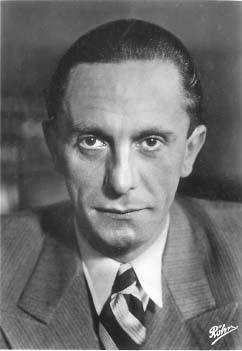Washington Post, June 4, 1996
Richard Cohen Irving's 'Goebbels' - No Need to Be Timid
He is also an indefatigable researcher. That accounts for how he became the first Westerner to get his hands on the massive (80,000 pages) diaries of Joseph Goebbels, the Nazis' propaganda minister and, it has to be said, a thoroughly rotten human being. In 1992, the diaries were discovered in the former Soviet archives in Moscow; Irving got to them that same year and his book is the result. The book was sent to me from England, in a suitably unmarked envelope, following the well-worn Lady Chatterley route. This is the way "Lady Chatterley's Lover" and other proscribed books used to get into this country - smuggled through customs, mailed from abroad and, sometimes, rebound as volumes of Shakespeare. I remember a certain "Hamlet" of my youth which, once past the cover, turned out to be a collection of erotic short stories written with a certain literary flair. Never had the Bard been so bawdy. My credentials as a historian are nonexistent. I have done my reading, of course, but I need others to tell me where Irving departs from the truth and veers into his own antisemitic fantasies. But by now I have read a score of reviews on the book, most from British newspapers, and have a pretty good idea what the author is up to. This book all but blames Goebbels for the Holocaust. In Irving's view, the German leader was not the antisemite he has been cracked up to be. His associates, though, were not men of Hitlerian moderation. Okay. It's a stupid theory and, beyond that, tasteless as well. As for the book, it is fetid with repellent judgments and characterizations, including the repeated depiction of the Jews as worthy adversaries of the Nazis. In Irving's telling, this is almost an even fight. The German press, he says, was largely Jewish. He says Jews and Communists "poured vitriol over the new Hitler government" while "irresponsible foreign journalists did the rest." After that, you see, industrial murder was, perhaps, understandable. But stupid, too, has been the resulting phenomenon-cum-controversy. The book has been attacked by newspaper columnists (some of whom never read it) and, just the other day, was given a review of sorts in the New York Times Book Review even though it is not available in the United States. I, though, stand with Christopher Hitchens of Vanity Fair and a host of British reviewers: This book is worth reading. The Goebbels diaries themselves are, of course, of vast historic interest, but more often than not, they are written in a sort of code. Goebbels shields his private life, and so it takes a crack researcher to know that when the little Nazi says he took a walk next door, it was to visit the actress with whom he had fallen madly in love. As for Irving's biases, they are mostly so flagrant they might as well come flagged with a warning from Jack Valenti. Nowhere else, though, have I read an account of Kristallnacht, that night of government-sanctioned violence against Jews, that credits Goebbels with both the idea and the excess. "Goebbels was the motor, goading his reluctant Führer into ever more radical actions against the Jews." True? I cannot say. But the evidence for such a statement can be found in Goebbels's own handwriting, although as Irving repeatedly warns, Goebbels lied to everyone, including his own diary. More the point, this maverick theory may well be worth debating. In such a fashion does knowledge emerge. Sometimes while reading this book, I thought Irving was just plain crazy, and if we were in a room together, I would have gone for his throat. He is a thoroughly repulsive character, and if I were a book publisher, David Irving would never be on my list. But we cannot get to the point where the Holocaust, which
is a historic event, gets to be treated like a biblical
story - beyond criticism and shielded from hostile
scholarship. Yet this book, which has been written about in
The Post and New York Times, the Nation magazine and Vanity
Fair, has effectively been banned in the United States.
Whatever its merits or faults, you have been deprived of the
right to judge for yourself. That's not censorship in this
case. It seems merely to be timidity. |
